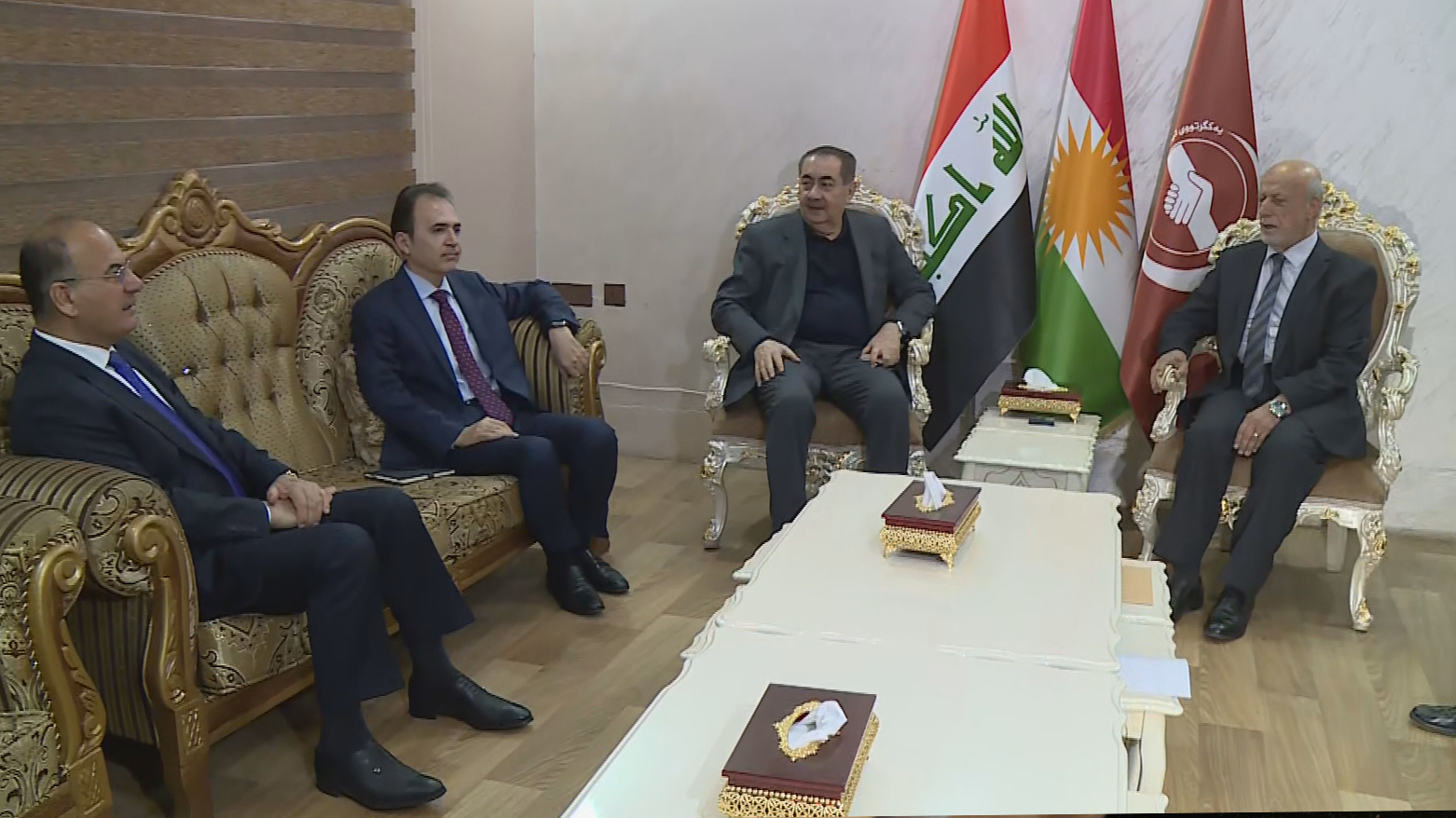KDP–KIU Leaderships Meet in Erbil as Kurdish–Shiite Veto Blocks Halbousi’s Return to Parliament Speakership
High-level talks underscore efforts to unify Kurdish positions amid Baghdad’s escalating government-formation standoff.

ERBIL (Kurdistan24) — A senior delegation from the Kurdistan Democratic Party (KDP) Politburo met with leaders of the Kurdistan Islamic Union (KIU) in Erbil on Wednesday, as political maneuvering intensifies in both the Kurdistan Region and Baghdad. The discussions came at a critical moment: while Kurds attempt to coordinate their positions on the next KRG cabinet, Baghdad’s Sunni parties are racing to nominate a new speaker—but face a decisive Kurdish–Shiite veto blocking former Speaker Mohammed al-Halbousi from reclaiming the post.
KDP–KIU Talks Seek Unified Kurdish Position
The KDP delegation—comprising Hoshyar Zebari, Politburo Executive Member; Ali Hussein, Politburo Member and head of the Sulaimani office; and Pishtwan Sadiq, Politburo Member and head of the Erbil office—held wide-ranging discussions with a KIU leadership team including Hadi Ali, Deputy Secretary-General; Mohammed Hawdiyani, Politburo Member; and Salahaddin Babakr, Spokesperson and Politburo Member.
According to sources, the two sides addressed several critical files:
- Results of the recent Iraqi parliamentary elections.
- Formation of the next Kurdistan Regional Government (KRG).
- Erbil–Baghdad ties.
- The broader political climate in Iraq and the region.
The meeting comes as negotiations to form the KRG's tenth cabinet have recently stagnated. Kurdish parties, under increasing pressure to present a unified stance, see consultations like today’s as essential for navigating the next phase of political bargaining with federal actors.
Kurdish–Shiite Veto Blocks Halbousi, Reshapes Sunni Calculations
The talks coincided with mounting Sunni efforts to consolidate behind a new candidate for the Iraqi parliament speakership—a post historically reserved for Sunnis since 2003.
Sources within the Sunni “Siyada Alliance” told Kurdistan24 that intense deliberations are underway, but Mohammed al-Halbousi is effectively barred from returning to the position due to a joint Kurdish–Shiite veto.
The veto marks a major political setback for Halbousi, who previously served as Iraq’s youngest-ever speaker, elected in 2018 and re-endorsed in 2022 before the Federal Supreme Court revoked his membership in the parliament in late 2023.
Sunni factions aim to announce their final candidate within days, possibly as early as this week or next. In earlier meetings, all Sunni blocs agreed to secure the speakership portfolio collectively—while Halbousi’s Progress 'Taqaddum' Party is now pushing to bargain for the Vice President role, a sovereign ministry, and a key service ministry if it cannot reclaim the speakership.
Sunni parties emerged from the November 2025 elections with more than 70 parliamentary seats, giving them significant influence in Baghdad’s government-formation process. On Sunday, five major Sunni blocs—Taqaddum, Azm, Siyada, Hasm al Watani, and Jamaheer—met at the residence of Khamis al-Khanjar, leader of the Siyada Alliance in Baghdad.
The meeting resulted in a decision to establish a four-year “National Political Council” to coordinate Sunni strategy in the new parliamentary term. According to participants, the goal is to consolidate Sunni unity and safeguard provincial rights while expanding their stake in Iraq’s next government.
Iraq’s Political Landscape Tightens Ahead of Government Formation
Iraq held its sixth parliamentary elections on Nov. 11, following a special vote on Nov. 9. Turnout reached 82.42% in the special vote and 54.35% in the general vote. With the election results now finalized, all major components—Kurds, Shiites, and Sunnis—are negotiating power-sharing formulas.
For Sunnis, the speakership remains a priority. For Kurds, internal coordination—such as today’s KDP–KIU meeting—is becoming increasingly crucial as the Region prepares for government formation amid budget disputes with Baghdad and stalled Erbil–Baghdad dialogue.
Since the U.S.-led restructuring of Iraq’s political order in 2003, the speakership has formed part of an unwritten power-sharing system:
- Speaker of Parliament — Sunni
- President — Kurd
- Prime Minister — Shiite
Halbousi held the post from 2018 until his removal in 2023. After months of vacancy, Sunnis agreed in early 2024 to nominate Mahmoud al-Mashhadani as speaker, who was later approved by parliament.
Today’s meeting in Erbil highlights the growing urgency among Kurdish parties to synchronize their strategies—not only for internal KRG negotiations but also to maximize their leverage in Baghdad at a time when their veto power is shaping the national political map.
With Sunni blocs and Shiite alliances recalibrating — and the KRG still navigating the fallout of budgetary and administrative disputes with Baghdad — Kurdish unity has emerged as a defining factor in Iraq’s post-election equation.